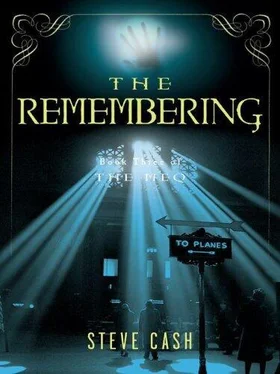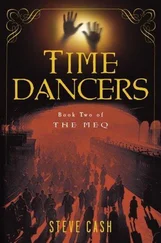The Fleur-du-Mal was the last to be greeted. The boy looked hard into the Fleur-du-Mal’s eyes, scanning, searching, then folded the cube of salt into his palm. “For many, many reasons,” he said, “I thought this day might never occur.”
The Fleur-du-Mal stared back without expression, then with a hint of his usual arrogance, he said, “I have a question, sir.”
“I assume you have several, and please, do not call me ‘sir.’ ” The boy turned and glanced at Geaxi, who was following his every word and gesture.
“Of course. Tell me … West … how is it possible for you to know so much about us when, before today, we have never known of your existence?”
No one moved or spoke and the moment hung in the air. I felt like I was in the Wizard of Oz and the Wizard was about to be revealed. “A fair question,” West said slowly.
“And one that deserves an answer.” It was another high-pitched, raspy voice coming from somewhere behind us. We all turned at once. Walking into the big room and carrying a tray of finger sandwiches, scones, and berries, along with a vase full of fresh-cut yellow roses was a girl who resembled West in every way except her hair, which was longer and a deeper rust-colored shade of red. She wore blue jeans tucked into green rubber Wellington boots, like West, and a well-worn corduroy jacket over a white cotton shirt. She also possessed the most powerful essence, aura, and presence of Meq I had ever felt. Following her was the old man we’d met at the door. He carried a tray holding a teapot and a dozen cups made of finely decorated Spode china. They both set down their trays on the long coffee table in front of the couch. The girl looked once at West and the old man turned to leave. “Thank you, Mr. Morgan,” she said after him, then began pouring tea into each of the cups. Speaking to us, but not looking at us, she said, “This is one of our special teas, very rare — Jun Shan Silver Needles. I hope you enjoy it. And you must try the blackberries.” She filled the last of the teacups and turned her head, staring directly at the Fleur-du-Mal. “They ripened early this year,” she said.
The Fleur-du-Mal stared back, and in that moment, in that split second between the angled shafts of sunlight, something so stunning and so unexpected occurred that it seemed imaginary. But it was real, it was a bolt of lightning, and it was “clear as a tear,” as Ray would say. And as with Geaxi, there was no doubt. Xanti Otso, the Fleur-du-Mal, had just looked into the eyes of his Ameq for the first time.
Holding two cups of tea, she walked calmly over to the Fleur-du-Mal. Her hands and fingers were noticeably broader and stronger than our hands and fingers, yet she offered him a cup of tea with the delicacy, charm, and sophistication of a lady of the manor. Then, without warning, but with the exuberance of a football fan, she tapped her cup against the Fleur-du-Mal’s, spilling some of the tea on the great Persian rug. She laughed like a schoolgirl and gave him a mischievous look, saying “Cheers!”
For a moment the Fleur-du-Mal stood mute and frozen, and so did the rest of us. He turned and looked at West, who gave nothing away, then turned back to the girl. Gradually, he awakened to something inside, and a smile began to spread across his face. “What is your name?” he asked.
“In the Language of the Long Dream , I am called by this name,” she said, then made a series of high-pitched, unpronounceable sounds that looped and clicked and squealed together until she stopped.
The Fleur-du-Mal frowned and rubbed his chin with his hand. He glanced at me. I knew he had understood what she had said because he had learned the “dream language,” but what her name meant was too complex to be a name in the same way that we use names. “Well, mon petit? ” he asked. “How would you translate that?”
In a formal sense, the name meant “Traveler-All Spirits,” yet it was much more than that. Contained within her name were other names — the Finder of Souls, the Singer, the Far Seer, the Long Listener, the Retriever, the Returner, and many others, all connected with complicated emotional and psychological nuances.
“Yes,” the girl said to me, studying my eyes. “What would you have me called?”
“Fielder,” I answered immediately, thinking of baseball. A good fielder sees and catches everything, including souls.
“Fielder?” the Fleur-du-Mal said.
“Yes. Fielder. It’s as good as any.”
“I adore the name,” the girl said. “Fielder it is, then. I have had many names in the past, but never Fielder.” She exchanged looks with the Fleur-du-Mal, then looked at Geaxi and nodded once, as if introducing herself. She turned to West. “And your name is now ‘West’?”
“Yes, it is,” he said with a smile.
“Good. It suits you.” She paused, taking time to look into the eyes of each of us. “Now,” she said, motioning toward the couch and chairs, “let us sit and share the tea and scones and discuss the last thirty thousand years, shall we?”
Events were happening too quickly to calculate and yet time seemed to slow down in every way. The curtains were opened even wider and we gathered in chairs surrounding the coffee table and couch. The view through the windows to the south and west revealed the steep cliffs and ragged coastline only a few hundred yards away, and the sea below stretching all the way to the horizon. And Fielder was right. The blackberries were delicious. Larger than the ones that would ripen later, they tasted pure and intense. I nibbled on them and sipped my tea and listened. For the next hour and a half we all listened. The old ones among us, Susheela the Ninth, Sailor, Opari, Trumoi-Meq, each heard things they had never heard before, and we all learned things about the Meq we could never have imagined.
West let Fielder begin, saying she would answer the question the Fleur-du-Mal had asked because she was the answer. Fielder explained by starting with her birth, which was approximately thirty-four thousand years ago in what is now Croatia. Although she was born with the ability to be a “tracker” and “finder of souls,” she had to be nurtured and taught how to do it accurately and at greater and greater distances. Fielder’s teacher was her own mother, who also was the head of their tribe of sixty-three souls, or “Travelers,” as they referred to themselves. They were Meq, like us, but they were in the form of a human species we now erroneously term Neanderthal. And, like our unique and ancient relationship with the Basque, they traveled alongside several tribes of their “parent” species, who acted as protectors. And travel they did. Fielder told of some journeys lasting centuries and covering thousands of miles, which required much more mobility and technical skill than modern anthropologists attribute to them. During these travels, Fielder’s ability to “find” and “hear” others was a valuable and necessary tool for survival. In time, she became known as “Keeper of Souls” because of her expanding powers. Intuitively, at any given time, she knew where every living soul of her kind was on the planet. Then came the newcomers, the ones we now call Giza. She had heard of them, but she had never seen them. And along with the newcomers there were us. There were not many of us, but we were there. Fielder said, “I could feel your arrival and count your numbers on ten fingers … just as I do now.”
Though she was living far to the north, she followed the movements of our ancestors and the newcomers with her ability. Our numbers multiplied quickly, and our adaptation to the climate was just as rapid. Eventually, she heard rumors of trade and the exchange of gifts between the newcomers and her kind. At first, the reports were positive, and coexistence seemed to be evolving. But another wave of newcomers soon appeared, and their gift was something else entirely. It was not a tool or an animal skin or a beautiful string of beads and shells. It was silent, powerful, unknown, invisible, and no shaman could give it back.
Читать дальше












